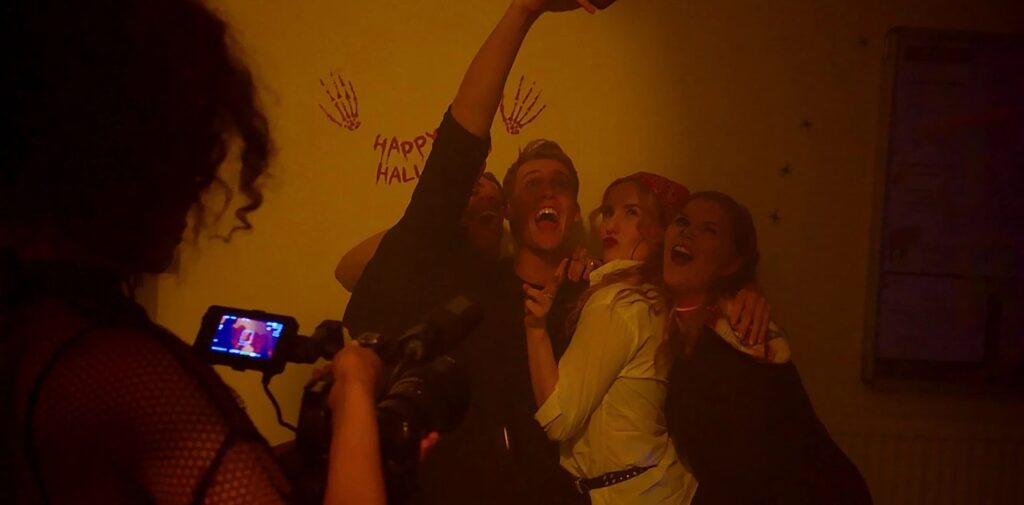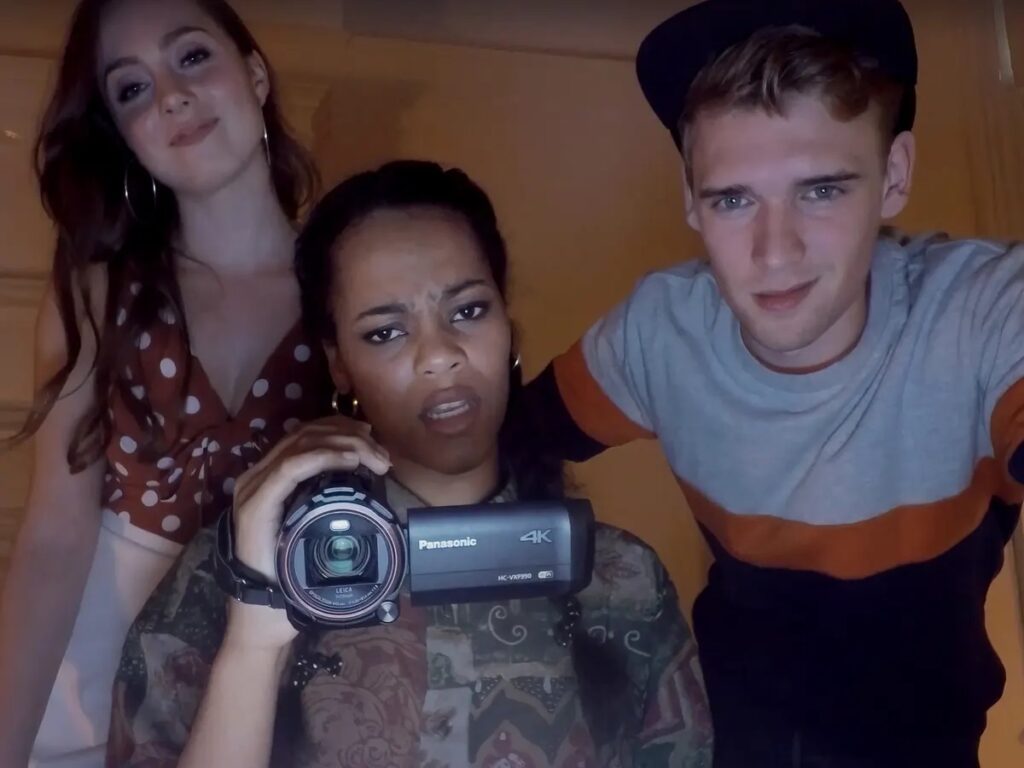Followers opens with a promising punch: a series of found-footage shots of suburban life chopped through with clips of YouTube style vloggers and narration by a friend of Jonty (Harry Jarvis), a small-fry influencer who we soon learn has fallen from fickle internet grace. Precisely what Jonty has done is not divulged – we can assume this omission is testament to the social media tempest’s mercurial nature; when the shitstorm passes, little is left in its wake but the vague stench of disgrace.
Through Jonty’s vlogs we soon learn that he fits every stereotype of the average social-media influencer: narcissistic, smarmy and desperately cringey. Considering the sheer barrage of recent cinematic depictions of the social-media landscape (often more of a hellscape), it’s puzzling that so many of these films fall flat. Perhaps there’s the sense of preaching to the choir; since many of us spend so much of our lives online, we’re already well-versed in influencer lore. Maybe we’re hoping for a spin that’s less one-dimensional than that proffered by Followers and so many others.

This would-be horror directed by Marcus Harben initially draws viewers in with a technical flare reminiscent of Anneesh Chaganty’s masterclass in screenlife filmmaking, Searching. Beyond the first few minutes however, Followers seems to settle into a more conventional form of narrative storytelling, intermittently and a little clunkily spliced with voice-over and Jonty and his housemates’ online vlogs. Like Matt Spicer’s Ingrid Goes West, Followers features mentally unstable protagonists and their frenzied pursuit of internet fame. Whilst Spicer’s film ramps up the black comedy and places emphasis on character psychology, Followers seeks to merge elements of both comedy and horror to approach the influencer issue. Damningly, however, Harben’s feature misses the mark on both accounts, seldom managing to rouse more than a faint knowing chuckle amongst an opening week screening audience in Leicester Square, and definitely nothing much like fear.
As the plot unfurls, Jonty moves into student accommodation along with three new housemates. A typically motley crew thrown together by their university housing service, we encounter aspiring documentary maker Zauna (Loreece Harrison) and hot-girl influencer Amber (Erin Austen). Their fourth housemate, Pete (Daniel Cahill), seems to be positioned as the audience’s scathing observational mouthpiece—a doctoral student and Scotsman with little time for the juvenile self-indulgence attributable to the rest of the gang.
It’s not long until their student house is plagued with paranormal activity. With the group attempting to document their haunting via CCTV style cameras installed around their digs, Followers will remind viewers of supernatural horror Paranormal Activity, but, fifteen years on, never quite reaches new heights.
In the wake of the semi-farcical hauntings – taking the form of periodic blaring of 90s jungle music, devices with a mind of their own (and a penchant for Ghost Hunters style reality TV shows), and aggressive bumps and thuds – the group becomes notorious on campus, drawing a raucous party-crowd in an attempt to court the unhappy apparition beleaguering their otherwise ordinarily grotty and mundane student residence. It’s a shame that the YouTube style commentary of onlookers’ vlogs feels forced and trite. With more astute integration of different video forms with the main narrative Followers could have approached something fresher and more dynamic than that with which we’re left.
Jonty takes the group’s new scale of public exposure in his superficial stride and whilst his follower count multiplies, Becky (Nina Wadia), the plucky student liaison officer and aspiring web-based life-coach, seeks to ingratiate herself with the students. Becky serves to diffuse the film’s otherwise ageist treatment of the social media dilemma in constituting the only character over thirty seized by the allure of online acclaim, yet Harben’s heavy-handed treatment of her character’s development leaves much to be desired.

The narrative pacing of the film is somewhat jarring and its gruesome supernatural conclusion feels rushed and a compensation for a muddled and lengthy plot development earlier on.
Ultimately, Followers falls prey to the same dissonant inanity that it aims to satirise, with insufficient critical distance from its material to really make a novel statement about the social-media sphere. Alas, another film joins the annals of shallow social-media critiques with which viewers are by now well-acquainted. The battle for our attention was won so long ago, it seems, that we can scarcely remember a life before haptic screens and the ‘Like’ economy. One can scarcely imagine having lived through the last two years of the COVID-19 pandemic, Black Lives Matter protests or even the ongoing war in Ukraine, if not for the unabated, total (dis)integration of our lives with digital media.
With police brutality and war crimes being captured on civilian cameras and proliferating on social-media platforms, we exist through and contribute to what appears to be an ever-expanding digital archive of popular warfare between digitally literate net denizens and an advancing technocapitalist police state.
That’s not to say there isn’t ample room for satire and horror with regard to influencer culture. Media-theorist Geert Lovink has observed that when platform and individual are no longer separable, social networking becomes synonymous with the social itself. Surely there’s something more interesting to say about the social fabric of our world than simply denouncing platforms like YouTube as a corrupting influence…
Beyond Charlie Brooker’s Netflix produced Black Mirror series and its depiction of rife desperation for online social-credit as a means of survival, we’ve yet to really experience any worthy filmic depiction of influencer culture that acknowledges our collective complicity in the attention-economy. In order to move past the most basic critique of the deficiencies of aberrant individuals like Jonty, perhaps we need characters a little more endearing, a little more lifelike than the cookie-cutter representations most films provide. And if instead Followers was to parody homogenous treatment of the social-media nexus by developing the influencer-antagonist ad absurdum, it might have at least been funnier than the boomer memes your mum shares on Facebook.
Followers is out in cinemas now.
